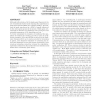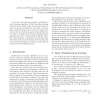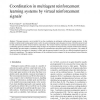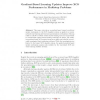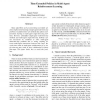88
Voted
ECML
2003
Springer
15 years 5 months ago
2003
Springer
We present in this paper a method to introduce a priori knowledge into reinforcement learning using temporally extended actions. The aim of our work is to reduce the learning time ...
123
Voted
ECML
2003
Springer
15 years 5 months ago
2003
Springer
Due to the unavoidable fact that a robot’s sensors will be limited in some manner, it is entirely possible that it can find itself unable to distinguish between differing state...
105
click to vote
ATAL
2003
Springer
15 years 5 months ago
2003
Springer
Although well understood in the single-agent framework, the use of traditional reinforcement learning (RL) algorithms in multi-agent systems (MAS) is not always justified. The fe...
ATAL
2003
Springer
15 years 5 months ago
2003
Springer
Much emphasis in multiagent reinforcement learning (MARL) research is placed on ensuring that MARL algorithms (eventually) converge to desirable equilibria. As in standard reinfor...
150
click to vote
ICTAI
2003
IEEE
15 years 5 months ago
2003
IEEE
One of the very interesting properties of Reinforcement Learning algorithms is that they allow learning without prior knowledge of the environment. However, when the agents use al...
101
Voted
IAT
2003
IEEE
15 years 5 months ago
2003
IEEE
This paper presents a multi-agent reinforcement learning bidding approach (MARLBS) for performing multi-agent reinforcement learning. MARLBS integrates reinforcement learning, bid...
104
Voted
KES
2004
Springer
15 years 5 months ago
2004
Springer
This paper presents a novel method for on-line coordination in multiagent reinforcement learning systems. In this method a reinforcement-learning agent learns to select its action ...
115
Voted
GECCO
2004
Springer
15 years 5 months ago
2004
Springer
This paper introduces a gradient-based reward prediction update mechanism to the XCS classifier system as applied in neuralnetwork type learning and function approximation mechani...
ECML
2004
Springer
15 years 5 months ago
2004
Springer
Abstract. We investigate the problem of using function approximation in reinforcement learning where the agent’s policy is represented as a classifier mapping states to actions....
104
Voted
ATAL
2004
Springer
15 years 5 months ago
2004
Springer
Many algorithms such as Q-learning successfully address reinforcement learning in single-agent multi-time-step problems. In addition there are methods that address reinforcement l...

